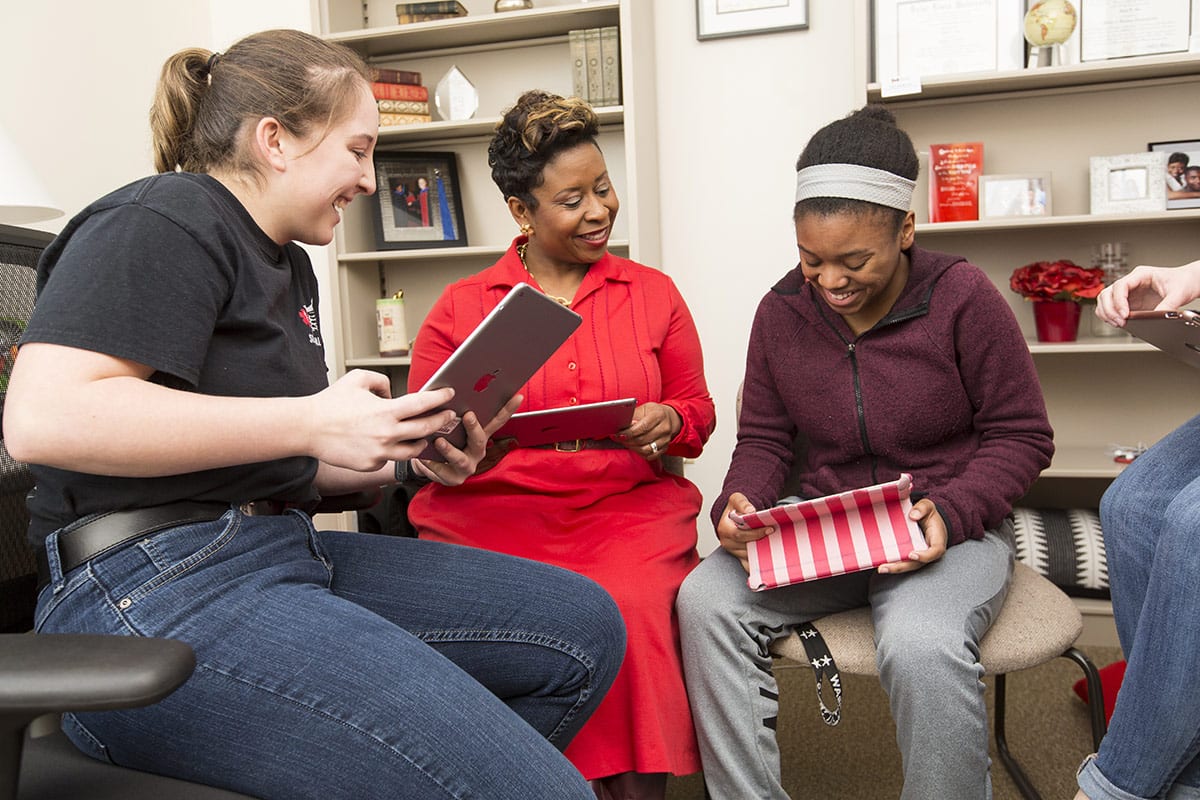Digital literacy is a twenty-first century workforce imperative. It’s not enough to understand apps like Uber, Twitter, Yelp, Google Maps or Spotify. College students today need to know how to use business productivity apps — really use them — because nearly every industry relies on them.
“Students come to college thinking they ‘know’ technology, but they have a lot to learn about critically thinking through technology in a business environment,” says Stacy Hollins, PhD, associate professor of information systems and assistant dean for Maryville’s Simon School of Business.
“Students know how to use social networking tools. And they know how to bold and underline and italicize data. But when I ask them to create formulas in Excel or use other higher-level functions in business technologies, many of them don’t haven’t a clue,” she says.
Hollins, who joined the Maryville faculty last summer, has overhauled ISYS 100, the introductory information systems course formerly known as Computer Literacy and now called Digital Foundations.
The fundamentals of the course are the same as they’ve always been, Hollins says. It’s the study of systems used to move data around to improve profit and increase productivity. All first-year business students take the course, along with students in other disciplines that require it, such as physical therapy.
“The baseline skills are the same, even though we’re learning and using apps on the iPad instead of being tethered to computers,” says Hollins. “In addition to learning new digital technologies, students still need to know how to produce documents, create spreadsheets, design presentation and get into databases to query information.”
Digital World Applications
Throughout the course each student uses an iPad, not computers, Hollins says. The strategy is in keeping with Maryville’s Digital World program, which provides an iPad to all undergraduate students.
“The course covers many of the apps Maryville provides for students on the iPad, along with cloud computing and information literacy, which means knowing how to verify information using true data and primary sources,” Hollins says.
Freshman Mehak Lodhi, a business major who took Digital Foundations last fall, says Hollins makes the subject so interesting, she actually looked forward to going to class — despite the Monday morning schedule.
“Dr. Hollins taught me so much, I would have to write a whole essay on it,” Lodhi says. “I came into my first class with her, ISYS 100, knowing nothing about computers and iPads. She literally changed my way of looking at technology. She inspired me to like technology.”
Building Confidence and Skills
Students are often frustrated by the idea of technology before they even begin, says Hollins. “They come in thinking, ‘I’ll never get this, I’ll always be behind someone who gets this.’ I work on boosting their confidence in using technology, experimenting and not being afraid of breaking something or messing up a file.”
Among other skills, students learn file management systems, presentation software, collaboration tools and, of course, Excel, the software most in demand by faculty teaching advanced business classes as well as hiring managers, says Hollins.
“Using apps effectively is required in this course,” Hollins says. “I ask students to complete assignments for other classes using apps we’re learning. I’m saying, ‘What do you have due in your other class? Let’s find a way to use technology to get it done.’”
Victoria Trammell, majoring in communication sciences and disorders, recalls the benefit of that learning strategy.
“I had an Infographic due in another class, but I had never done one before,” Trammell says. “Professor Hollins taught us how to make an infographic correctly, and then I could do my project.”
Breanna McJunkins, a cyber security major, appreciates that Hollins makes her classes relevant for the business world.
“She absolutely loves group work because in our future jobs, we will have to do lots of group work with our companies,” McJunkins says. “She makes us step out of our comfort zone and use abstract thinking all of the time. I’ve learned how important it is to think outside the box when it comes to ideas because nobody wants (to hire) someone who can’t think on their own.”
Hollins knows information systems can be a dry subject, but she’s determined to bring it to life for students through personal examples from the business world and by emphasizing collaborative learning.
“In this world, we’re not going to be able to live without any of this. It’s used in every industry; students won’t leave Maryville without touching what I teach,” Hollins says. “From the president’s office to any other area in an organization, you can’t get around information systems — it’s valued throughout any business. Students will be able use it for the rest of their lives and build on it; it’s not a niche subject.”
